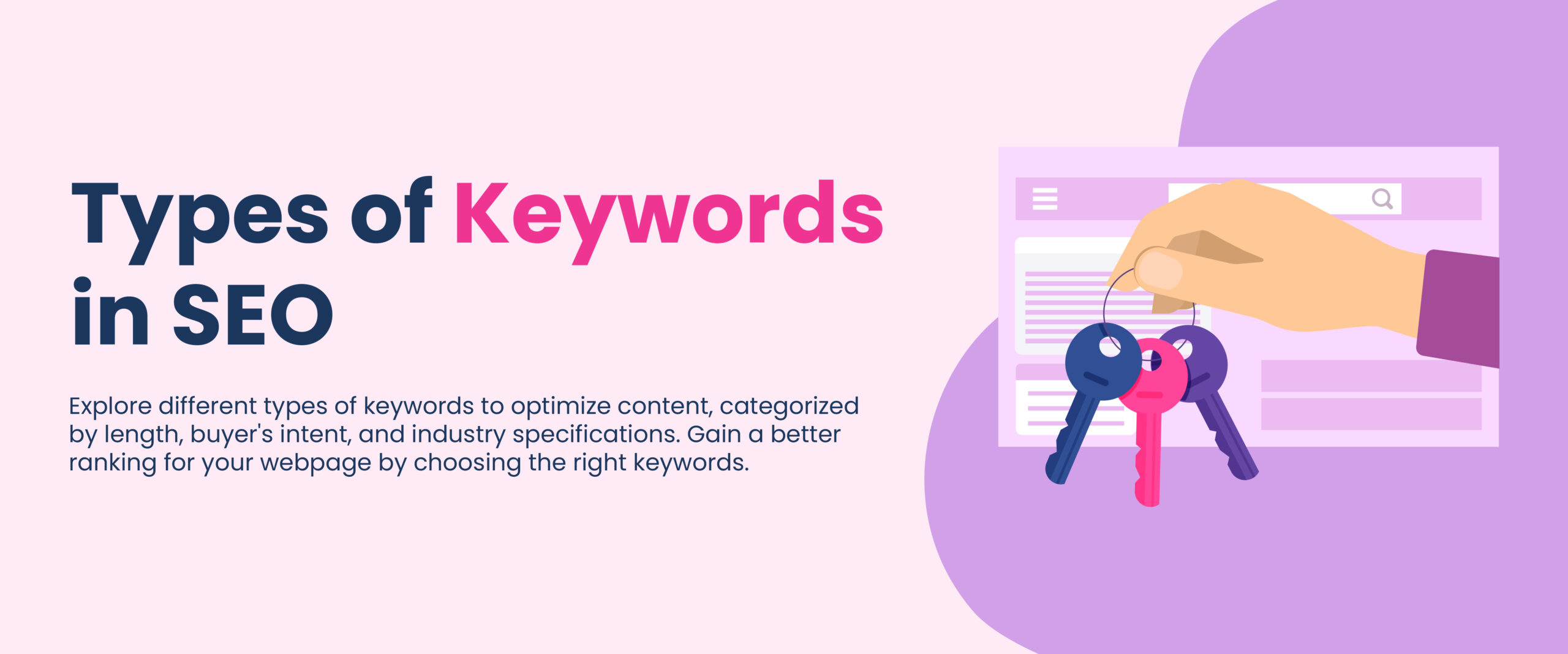Types of Keywords in SEO – Based on Length, Buyer Intent, Industry, & More
When it comes to SEO, keywords are a critical factor that can make or break your website’s success. Understanding what keywords are and why they matter is an important first step for any business looking to increase their online visibility. The importance of keywords is backed by data stating that 50% of search queries contain 4 or more words. In this blog, we’ll see the different types of keywords in SEO, explore their importance, and how they cater to different aspects of online marketing strategies.
What are Keywords?
Keywords refer to words and phrases used in content that help search engines understand what the page is about. By using relevant terms throughout your web pages, you ensure that your website will appear in searches related to those topics. This not only improves the user experience by delivering them more accurate results but also helps drive traffic from organic sources like Google and Bing. To learn more about the types of keywords in SEO, you can pursue a professional digital marketing course.
Why are Keywords Important?
In SEO, keywords are crucial since they increase organic traffic to websites and help them rank higher in search engine results. Businesses may attract consumers who are actively looking for their goods or services by optimizing content around appropriate keywords. Any effective SEO strategy must include keywords since they can increase visibility, improve click-through rates, and increase conversions.
SEO Keywords According to Length
There are mostly three types of keywords in SEO, according to length. They are as follows:
1. Short-Tail Keywords
Short-tail keywords are the most common type of keyword used in SEO, and they typically consist of one or two words. These keywords work well for broad topics like “travel” or “clothes,” but because there is so much competition, you may have difficulty ranking for them. However, when used strategically with other tactics such as backlinks and content optimization, they can still be effective. Short tail keywords tend to generate a lot of traffic but also attract users who are likely not looking for what your website has to offer specifically.
2. Mid-Tail Keywords
Mid-tail keywords provide more targeted results than short-tail keywords by combining multiple words into phrases. This approach gives you better chances to rank on search engine result pages (SERPs) due to their specificity and lower competition levels compared to shorter terms. For instance, if someone searches “cheap travel deals” instead of just “travel” then it becomes easier for your website to appear in the SERP since this term narrows down the competition significantly from the millions of websites that could show up under the broader term of simply “travel”.
3. Long-Tail Keywords
Long-tail keywords include three or more words to target very specific user intent. Longer phrases usually include modifiers like adjectives, which make them highly precise and relevant compared with other types of SEO terms, though unfortunately, they tend to generate fewer views since people rarely use them in searches online. Still, these longer phrases can help create valuable leads by bringing visitors directly interested in whatever product/service you offer without any extra effort from you.
Explore the best digital marketing course with placement guarantee to excel in all the concepts of digital marketing.
SEO Keywords According to Buyer Intent
SEO keywords by buyer intent help you narrow down your search choices for keywords. Some of the keywords are:
1. Informational Keywords
Informational keywords are queries that the user is using to look up information on a certain topic. These terms typically focus on how or why something works and don’t necessarily imply any specific action from the searcher. Examples include “How does SEO work?” and “What is a keyword?” Optimizing content with informational keywords can help drive organic traffic to your site as potential customers use them to research products or services they may be interested in buying.
2. Navigational Keywords
Navigational keywords are used by users looking for a particular website, product, brand, or service online. This type of query implies an intention to take some kind of action—usually visiting the website directly—so it allows marketers more opportunities for conversions if their page appears at the top of SERPs for such terms. Common navigational keywords might be “Apple Store Delhi” or “Nike Running Shoe Men.”
3. Transactional Keywords
Transactional keywords indicate an intent to purchase something from search engine results pages (SERP). They often contain words like “buy,” “order,” and other related actions and modifiers that show what type of transaction is being sought after. For instance, someone searching for “cheap laptop deals UK” likely has plans to buy one soon; optimizing content around this phrase could lead them directly to your store instead of another competitor.
4. Commercial Keywords
Commercial keywords refer specifically to advertising-related searches such as discount codes and promotional offers that businesses set up online to attract more buyers over time. These terms tend not only to bring people directly into contact with your company but also offer valuable insights about customer preferences, which you can use when planning campaigns for future marketing efforts.


SEO Keywords According to Industry
Some SEO keywords that are specific to certain industries are as follows:
1. Market Segment
Industry-specific terms that target a certain market niche are known as market segment keywords. It’s essential to understand the distinctive traits and preferences of each market group to use these keywords successfully.
2. Customer-Defining
These are expressions that refer to a particular category of customer. They are used by marketers to connect with a group of people who have similar traits, such as age or gender. For example, toys for toddlers, clothes for men, etc.
3. Product
Brand names are present in these keywords. They have greater conversion rates within a niche that favors or is devoted to a brand’s goods. For example, Apple products or Google products.
4. Geo-targeted
Geo-targeted keywords are crucial for businesses that want to target a particular area or location. Businesses can appear in local search results by incorporating location-specific terms into their relevant keywords, such as city names, state names, or country names.
Conclusion
Understanding the specific keywords that are relevant to your industry is key to successful SEO and online visibility. Depending on your market segment, customer-defining characteristics, product offering, and geographic targeting you’ll need different types of keywords in SEO to reach your target audience.







